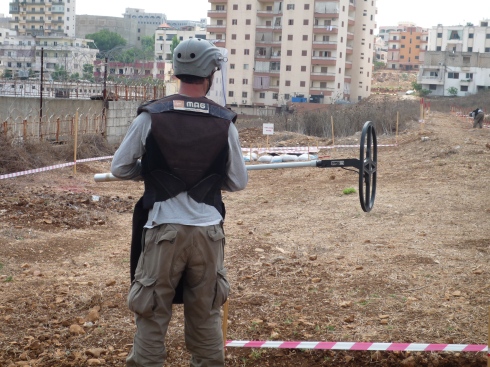Lebanon may have escaped the tumult of the so-called Arab Spring, but the country’s ruling classes seem illiterate to its main message: that conceited rulers who do little to assist ordinary people in their daily quest for dignity will one day face their wrath.
Compared to elsewhere in the region, things look calm in tiny Lebanon. But underneath the photo-shopped veneer promoted by the Ministry of Tourism lies a steadily boiling pot of despair and ruin.
Today marks the 37th anniversary of the outbreak of Lebanon’s civil war. In 15 years of horrific violence, up to 300,000 people were killed and 17,000 are still considered missing. Lebanon never had a truth and justice commission and ignored its international obligations to investigate the whereabouts of the missing. Instead, it introduced a sweeping amnesty law in 1990, which allowed many militia leaders to return to Lebanese politics as ministers. Their sectarian grievances now mostly play out in Parliament, but followers of their personality cults occasionally still fight it out on the streets or on television. Because of the constant political bickering, issues of critical importance to the nation are being left to rot, quite literally.
An on-going scandal has exposed a number of factories selling meat products years past their sell-by dates to the country’s supermarkets and restaurants. Only a few arrests have been made, however, and commentators are pessimistic that government pledges for a full investigation will translate to meaningful action.
In January, a residential building in Beirut collapsed suddenly, killing 27 people. This was followed by several other collapses, including a school wall, which crushed three pupils to death. But despite the urgency for new building regulations, the government is doing little to prevent further similar catastrophes, choosing only to demolish one bridge experts have been warning might buckle for years.
The country’s list of woes goes on and on. Migrant workers not protected by Lebanon’s labour law are committing suicide at startling rates and Lebanese women continue to struggle against institutionalised discrimination and misogyny. Lebanon’s overcrowded prisons have been described as tinderboxes teetering ever closer to disaster, as have the country’s landfills. The worst one, in the Southern city of Sidon, regularly collapses, dumping tonnes of hospital and chemical waste into the Mediterranean Sea. Gas and food prices have steadily increased over the last few months, making it virtually impossible for Lebanese living on the minimum wage (around £280) to make ends meet. To add insult to injury, Lebanon endures mandatory daily electricity cuts, ranging from three hours in the capital to around 12 hours daily in rural areas.
If this Sisyphean list of problems isn’t enough to stir the Lebanese leadership to action, one might think the crisis in Syria, which is slowing seeping its way across the border, would. Earlier this week Lebanese cameraman Ali Shaaban was shot dead, allegedly by Syrian soldiers, while on assignment near the border. There is frequent sectarian fighting between pro- and anti-Assad supporters in North Lebanon and the number of Syrians (mostly women now since Syria has placed a ban on all men between 18-40 years leaving the country) seeking refuge in Lebanon from the violence is growing steadily.
And yet, with all this trouble mounting, what does the Lebanese government choose to focus on? It is currently prosecuting a graffiti artist by the name of Semaan Khawwam, for “disturbing the peace” after he was caught spray-painting figures holding big guns.
Use of graffiti is widespread in the Lebanese capital. In the absence of a coherent protest movement, street art is increasingly being used to convey people’s grievances with the state, whether it be over the lack of a marital rape clause in the criminal code, widespread corruption, drink-driving, or high unemployment.
Khawwam’s soldier-like figure doesn’t clearly attack any person or institution, so it remains a mystery to many why his case is being pursued out of many thousand possibilities. More importantly, graffiti art is not actually illegal under Lebanese law. Yet he faces a fine and possibly three months in prison if convicted. His lawyer, Adel Houmani, made an important point when he questioned the legitimacy of the case: “If this artistic work is vandalism,” he told Al Akhbar newspaper, “then what do we say about the photos of leaders that are posted everywhere, in addition to all the random posters and ads?”
The case against Khawwam shows just how muddled the logic of Lebanon’s leadership is. This is a country where politicians struggle to identify the country’s most basic priorities, mainly because their priorities are to stay in power, leading luxurious lifestyles deeply out of touch with most of their constituents.
The writing, it would seem, is on the wall. It’s not only Lebanon’s meat, fish and poultry that is way past its expiry date- its leaders are too.
 A photograph of Alem Dechessa’s family has been published on Facebook. I reported last month that Ethiopian national Alem had committed suicide in a Lebanese hospital following the broadcasting of amateur footage showing a Lebanese man, Ali Mahfouz, abusing the 33-year-old migrant worker.
A photograph of Alem Dechessa’s family has been published on Facebook. I reported last month that Ethiopian national Alem had committed suicide in a Lebanese hospital following the broadcasting of amateur footage showing a Lebanese man, Ali Mahfouz, abusing the 33-year-old migrant worker.


![In April, the biggest prison riot in Lebanese history broke out in Roumieh penitentiary, prompting relatives of inmates to protest conditions inside [EPA] In April, the biggest prison riot in Lebanese history broke out in Roumieh penitentiary, prompting relatives of inmates to protest conditions inside [EPA]](https://gutterpoetry.files.wordpress.com/2011/07/epa.jpg?w=490)


Recent Comments